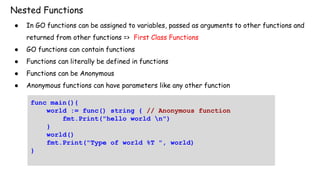Pointers & functions
- 1. Development with Go - Manjitsing K. Valvi
- 2. Pointers ● A variable is a piece of storage containing a value (Variables : Addressable values) ● A pointer value is the address of a variable - the location at which a value is stored ● Not every value has an address, but every variable does. ● We can access the value of a variable indirectly using pointers, without knowing/referring to name of the variable ● Example: x := 1 // variable of type int p := &x // p, of type *int, points to x (&x = address of x) fmt.Println(*p) // *p denotes value pointed by ‘p’ : "1" *p = 2 // equivalent to x = 2 ; *p can be on LHS of expr fmt.Println(x) // "2" ● Expressions that denote variables are the only expressions to which the address-of operator “&” may be applied
- 3. new Function ● new(T) ○ creates unnamed variable of Type T ○ Initializes it to zero value of T ○ Returns it address(type *T) ● new is a predeclared function, not a keyword ● Example: p := new(int) // p, of type *int, points to an unnamed int variable fmt.Println(*p) // "0" *p = 2 // sets the unnamed int to 2 fmt.Println(*p) // "2"
- 4. Functions ● It is possible to return multiple values from a function ● Multiple return values are specified between ( and ) ● It is possible to return named values from a function, it can be considered as being declared as a variable in the first line of the function func arithOps(a, b int)(sum, sub int) { // sum and sub are named sum = a + b // return values Sub = a - b return //no explicit return value, sum and sub are returned when //return is encountered } ● Blank identifier ‘ _’ can be used if any value is to be discarded from multiple return values
- 5. Variadic Functions ● It is a function that accepts a variable number of arguments ● Here the type of the final parameter is preceded by an ellipsis, "...", showing the function may be called with any number of arguments of this type ● Useful when number of arguments passed to a function are not known ● Built-in Println is best example of variadic functions func sum(nums ...int) { fmt.Print(nums, " ") total := 0 for _, num := range nums { total += num } fmt.Println(total) } func main() { sum(1, 2) sum(1, 2, 3) nums := []int{1, 2, 3, 4} sum(nums...) }
- 6. Nested Functions ● In GO functions can be assigned to variables, passed as arguments to other functions and returned from other functions => First Class Functions ● GO functions can contain functions ● Functions can literally be defined in functions ● Functions can be Anonymous ● Anonymous functions can have parameters like any other function func main(){ world := func() string { // Anonymous function fmt.Print("hello world n") } world() fmt.Print("Type of world %T ", world) }
- 7. User Defined Function Types ● In GO user can create his own function types (like struct) type add func(a int, b int) int // Creating function type add // with two int parameters func main() { var a add = func(a int, b int) int { // variable of type add return a + b } s := a(5, 6) // calling the function a fmt.Println("Sum", s) }
- 8. Closures ● is a function that references variables outside of its scope ● can outlive the scope in which it was created ● a special case of anonymous functions ● every closure is bound to its own surrounding variable func main() { a := 5 func() { fmt.Println("a =", a) // Anonymous function accessing ‘a’ // variable outside its body }() // This function is a closure }
- 9. Defer ● defer is useful when one wants to ensure about function getting executed even in case of failure of the program e.g closing the files, releasing the resources etc ● defer is also helpful in debugging OR in error handling mechanism of GO func fun(a int) { fmt.Println("a =",a) } func main() { a := 5 defer fun(a) // deferred function call fmt.Println("a =", a) // Anonymous function accessing ‘a’ } // Output is // a=6 a=5 // Since the call the function fun() is deferred, it is having the //value of a as 5
- 10. Defer ● Syntax : defer func_call( ) ● A function or method call can be prefixed with keyword defer ● Such function and argument expressions are evaluated when the statement is ● executed, but the actual call is deferred until the function containing the defer statement has finished ● No matter whether the function that contains defer statement ends normally or after panicking, the deferred function is called ● Any number of calls may be deferred; they are executed in the reverse of the order in which they were deferred func main() { a := 5 defer func(a) // deferred function call fmt.Println("a =", a) // Anonymous function accessing ‘a’ }





![Variadic Functions
● It is a function that accepts a variable number of arguments
● Here the type of the final parameter is preceded by an ellipsis, "...", showing the function
may be called with any number of arguments of this type
● Useful when number of arguments passed to a function are not known
● Built-in Println is best example of variadic functions
func sum(nums ...int) {
fmt.Print(nums, " ")
total := 0
for _, num := range nums {
total += num
}
fmt.Println(total)
}
func main() {
sum(1, 2)
sum(1, 2, 3)
nums := []int{1, 2, 3, 4}
sum(nums...)
}](https://image.slidesharecdn.com/pointersfunctions-211001084755/85/Pointers-functions-5-320.jpg)





